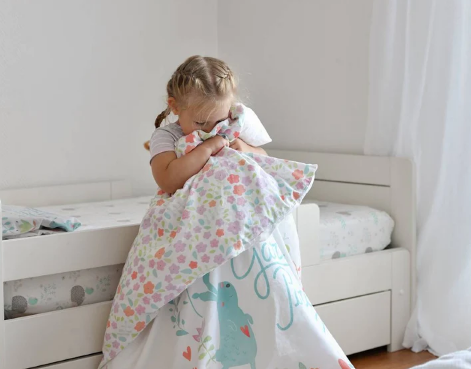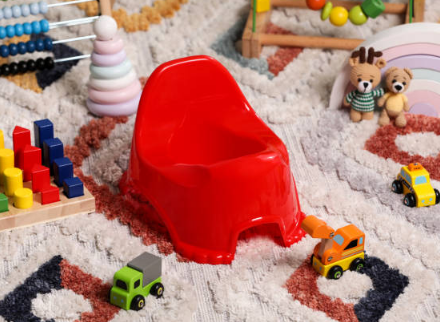Potty Training Authenticity: While most children are potty trained between the ages of 2 and 4, many are unable to stay dry for several years. In fact, studies show that up to 20% of children still wet their beds before the age of 5. While bedwetting is not necessarily a medical problem before the age of 7, there is no doubt that it is still a concern for parents and children. To learn more about why your potty training child wets the bed and what to do, read on.
How Common Is Bedwetting?
About 10% of children in the United States suffer from nocturnal enuresis, which doctors call bedwetting. According to the American Academy of Pediatrics (AAP), most children wet the bed during potty training… Even if they have been kept dry for weeks on end. (This is because the ability to control nocturnal bedwetting develops later.) About 5% of children aged 20 years or older who have nighttime accidents fall into one of two categories:
- Primary bedwetting: This is when a child over the age of 5 has not experienced a dry night for six months. This is the most common type of bedwetting in children.
- Secondary bedwetting: Here, children start wetting the bed after six months without wetting the bed. About 1 in 4 children who wet a bed will experience a second wetting.
Is bedwetting hereditary?
Experts at the University of North Carolina School of Medicine say bedwetting is closely linked to family history. In fact, the American Urological Association states that children without family ties are only 15% likely to wet the bed. Half of the parents of children who wet the bed also have bedwetting problems. Up to 75% of children who have a nighttime accident have parents who have bedwetting.

Will my child stop wetting the bed when he grows up?
Many children stop wetting the bed when they grow up. According to the American Academy of Pediatrics (AAP), only half of children who wet a bed at age 5 still wet a bed by age 7. It is estimated that only about 1% to 3% of children still experience nighttime accidents by the teenage years.
What Are the Causes of Bedwetting?
Most of the time, a nighttime accident does not indicate any greater medical or emotional problem. Conversely, bedwetting is often just a natural part of development. Once your child is mature enough, the nerves in the bladder wall send a message to the brain: “Hey, I’m full!” Your child’s brain will then immediately send a message to the bladder saying, “Hold on!” Until they wake up and are ready to go to the bathroom. Before that, here are some developmental reasons why your child may wet the bed:
- Small bladder. Your child’s bladder may not be developed enough to hold all the urine that the body produces overnight. (A child who urins frequently throughout the day may have a small bladder.)
- Neurodevelopment. If the nerves that control your baby’s bladder mature slowly, a full bladder may not wake your child, especially if they are sleeping deeply.
- Problems with sleep wakefulness. When your child is in a deep sleep, their brain doesn’t receive wake-up signals when their bladder is full. (This brain-bladder control develops over time.)
- The circadian rhythm is underdeveloped. Normally, antidiuretic hormone (ADH) is secreted at night, signaling the body to reduce urine production. However, when a child’s circadian rhythm is underdeveloped, antidiuretic hormone (ADH) does not rise at night, so there may be an excess of urine at night. (This is called nocturnal polyuria.)
Can Constipation Cause Bedwetting?
A 2020 study found that it can… Especially children between the ages of 5 and 12. According to the American Academy of Pediatrics, this is why treating constipation is often the first step in treating bedwetting. Constipation can lead to bedwetting in two different ways. First, the bladder and bowel are close to each other, which means that when a child is constipated, their bowels squeeze the bladder, resulting in inadvertent wetting. At the same time, the muscles used to control poop are the same muscles used to control urine. Therefore, when constipation is chronic, these muscles weaken and lead to bedwetting. Good news? Treating constipation may relieve your child’s bedwetting. To help your child progress, increase your daytime water intake, include more fiber-rich foods in your diet, and talk to your child’s pediatrician or urologist. They may prescribe a laxative to help “clean up” the accumulated stool and make your child more regular.
Sleep Problems That Can Lead to Bedwetting
It is not surprising that bedwetting has been associated with sleep disorders in children. After all, nighttime accidents are often closely related to waking up during the night. In fact, a 2020 report in the Italian Journal of Pediatrics found that almost 76% of children with bedwetting also reported poor sleep quality. But sleep problems themselves can also lead to bedwetting. According to the National Children’s Hospital, children whose sleep is disturbed by snoring, screens, or pets, as well as those who are asleep, are more likely to wet the bed. Some details:
- Sleep apnea: Up to 3% of children are thought to have obstructive sleep apnea (OSA). In children who snore regularly, the rate is as high as 10 to 20 percent. In OSA, poor breathing in children causes the heart to produce the hormone atrial natriuretic peptide (ANP), which causes the kidneys to produce extra urine during the night. (The most common treatment for OSA is tonsillectomy or adenoidectomy, which opens the airway.)
- Sleep-wake problems: When the bladder is full, your child’s brain doesn’t receive a “wake up” signal. Sometimes, messages are not received even after an accident. However, this “skill” develops naturally over time or can be accelerated with treatment.

- Sleepwalking: Sleepwalking is more common in boys and is often associated with bedwetting. While sleepwalking is a difficult behavior to contain, longer naps and going to bed earlier may help. Also, avoid giving your child chocolate or other stimulants, including antihistamines and decongestants. (Learn more about sleepwalking from Dr. Harvey Karp.)
- Excessive fatigue: Studies have shown that sleep deprivation greatly increases the likelihood of nighttime urination and bedwetting in otherwise healthy preteen children. Because bedwetting is more likely to occur when your child is overtired, bedtime should occur early and take a relaxing break of about an hour in dim light and white noise. (Learn more about Dr. Karp’s bedtime.)
Medical Problems That Can Lead to Bedwetting
Frequent or repeated bedwetting may indicate that something more worrying is happening to your child. In addition to the constipation and sleep apnea mentioned above, here are some common underlying conditions that can cause bedwetting:
ADHD: Children with ADHD are three times more likely to wet the bed than their peers. Although the cause is not fully understood, it is thought that both problems are related to central nervous system developmental delay. (Learn more about ADHD and sleep.)
Diabetes: For children who are often dry at night, bedwetting can be the first sign of type 1 diabetes. Other symptoms include urinating heavily at once, increased thirst, fatigue, and weight loss despite a good appetite.
Neurological or urinary system defects: Bedwetting is rarely associated with structural problems in the urinary tract or nervous system.
Urinary tract infections: Urinary tract infections can make it difficult for your child to control during the day and while sleeping, and symptoms include frequent and painful urination and red or pink urine.
Other Problems That Can Lead to Bedwetting
Any form of stress can cause a nighttime accident for your child. Bedwetting associated with stressors usually occurs more than six months after the child has been dry overnight. Some common social stressors that can affect bedwetting include:
- Accident or trauma
- The arrival of new siblings
- Divorce or separation
- Family crisis
- Sleep alone
- School
When to Talk to Your Doctor About Bedwetting
If your child has been fully potty trained for 6 months or more (no nighttime accidents) and suddenly starts wetting the bed, then it is best to contact your child’s healthcare provider. A seemingly inexplicable accident can be a sign of an underlying medical problem or a traumatic event. That said, most medical problems that quickly cause your child’s bedwetting have other signs, such as:
- There was blood on the underwear
- Changes in daytime urine volume and Xi
- Cloudy or pink urine
- Constant dampness
- Pee and poop accidents during the day
- Gait problems
- Pain, burning or straining when urinating
- Coughing, running or lifting weights and then urinating
- Sudden changes in personality or mood
- Weak or dribbling urine stream
Final Thoughts on Why Kids Wet the Bed
No matter how frustrated you may be by your child’s bedwetting, it’s important to remember that children don’t wet the bed on purpose. They are not lazy or willful. And, while bedwetting is not usually a serious condition, it can cause your child a great deal of pain and embarrassment. In fact, they may begin to avoid activities such as sleepover parties and overnight camps for fear of accidents that may occur while out and about.
For help discussing bedwetting with your child and tips on calming nighttime accidents, check out our guide to managing bedwetting. And consider using a waterproof, 100% washable toddler mattress (such as our pediatrician-designed DreamBreeZzz mattress) to take the stress out of accident cleanup for everyone. Also, place washable or disposable waterproof mattresses on sheets and always have spare sheets on hand. And, if needed, continue to provide your child with overnight pull-up diapers or absorbent underwear.
No matter how frustrated you may be by your child’s bedwetting, it’s important to remember that children don’t wet the bed on purpose. They are not lazy or willful. And, while bedwetting is not usually a serious condition, it can cause your child a great deal of pain and embarrassment. In fact, they may begin to avoid activities such as sleepover parties and overnight camps for fear of accidents that may occur while out and about.
For help discussing bedwetting with your child and tips on calming nighttime accidents, check out our guide to managing bedwetting. And consider using a waterproof, 100% washable toddler mattress to reduce the stress of accident cleanup for everyone. Also, place washable or disposable waterproof mattresses on top of sheets and always have spare sheets on hand. And, if needed, continue to provide your child with overnight pull-up diapers or absorbent underwear.

